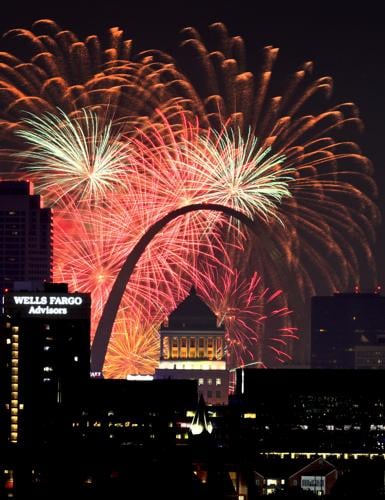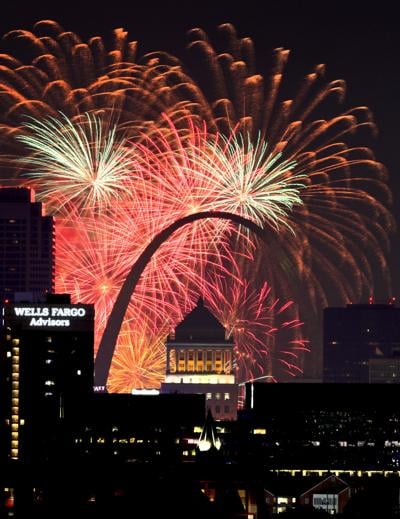ST. LOUIS ŌĆö City police warned parents Wednesday to keep track of their kids this holiday weekend. Or else.
Police officials said theyŌĆÖre employing a new strategy to curb July Fourth mayhem by increasing patrols, barricading potential problem areas and even issuing citations to parents whose children, unattended, cause chaos.
ŌĆ£Parents should step up and be parents,ŌĆØ department spokesman Mitch McCoy said.
The announcement comes after a spate of shootings and reports of illegal fireworks during the Fourth of July weekend last year drew sharp criticism from downtown visitors and business owners. Mayor Cara Spencer, then an alderwoman, accused her predecessor, Mayor Tishaura O. Jones, and police Chief Robert Tracy of downplaying the seriousness of the problem.
ŌĆ£To sum this up as just a few bad actors,ŌĆØ Spencer said then, ŌĆ£is dismissive of the fact we have let our downtown become a gathering spot for violent behavior on a regular basis.ŌĆØ
People are also reading…
This year, McCoy said the police department is changing its tack.
On Tuesday, authorities seized hundreds of fireworks, homemade explosives and two guns from a house in the 1000 block of North Kingshighway, McCoy said. Prosecutors charged Jameel Jadallah, 44, on Wednesday with two counts of being a felon in possession of a firearm. He was ordered to be held on a $5,000 cash bond.
By Tuesday night, city crews had erected barriers around Kiener Plaza downtown ŌĆö the site of illegal fireworks last year ŌĆö and the CityGarden sculpture park.
Then, on Wednesday afternoon, McCoy held a press conference to announce the other police strategy to cut down on crime.
He said officers planned to detain anyone younger than 17, beginning Thursday, who is posing a danger to themselves or others.
The parent would be cited under one of a handful of municipal charges, McCoy said, including contributing to the delinquency of a minor or allowing a minor to stay out after curfew. They also could be cited if they donŌĆÖt pick up their child within 45 minutes, .
All three of those citations carry a penalty of up to 90 days in jail, as much as a $500 fine, or both.
In general, McCoy said, the department would refrain from charging the juveniles themselves, but that discussion is ongoing.
ŌĆ£Right now, itŌĆÖs the parents who will be cited,ŌĆØ he said.
McCoy said the department will also ramp up patrols downtown ŌĆö both with uniformed officers and police in plainclothes ŌĆö and will dedicate officers to responding to fireworks calls throughout the city.
McCoy declined to say how many officers would be deployed because he didnŌĆÖt want to reveal too much about police tactics.
And he warned people coming downtown for the festivities to leave their valuables like guns, computers and jewelry at home.
If you bring bags or a wallet, he said, take them with you.
ŌĆ£At the end of the day, people are still smashing windows,ŌĆØ he said.
McCoy also noted that parking and road restrictions will be in effect beginning Wednesday:
- The Walnut exit on Interstate 44 will be closed until Saturday morning
- Market and Chestnut streets will be closed from 4th Street to Tucker Boulevard until 4 a.m. Saturday
- Parking is prohibited along Market and Chestnut streets until 4 a.m. Saturday
Any cars parked in the downtown no-parking zones will be relocated to surrounding streets. People whose cars are moved should call 314-231-1212 to find out where their vehicle is located, McCoy said.
The Fourth of July is undoubtedly the biggest day for fireworks in the United States.┬Ā The man responsible for the Fourth of July fireworks is said to be the 2nd US President, John Adams.┬Ā On July 3, 1776, Adams wrote a letter to his wife with instructions on how future Independence Days should be celebrated.┬Ā "Pomp and Parade, with Shews, Games, Sports, Guns, Bells, Bonfires and Illuminations from one End of this Continent to the other from this Time forever more." John Adams A year and one day later, the first-ever official Fourth of July fireworks display took place over Philadelphia.┬Ā This was despite the fact that the Revolutionary War was still underway and would continue until 1783.┬Ā By 1783, fireworks had become widely available to the general public, cementing their place as a tradition.















